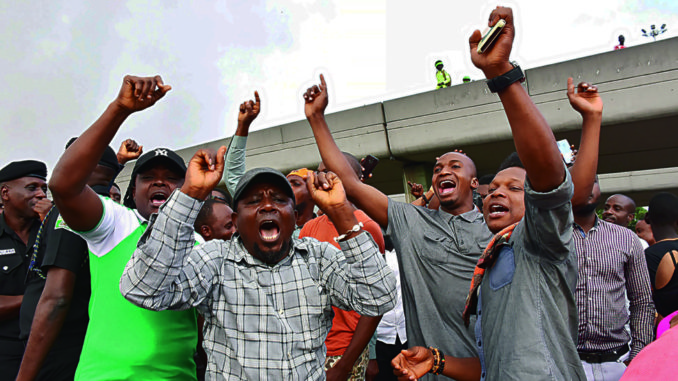
The country witnessed a flurry of protest the other day by some civil society actors and activists and the corresponding response from the government and the security arm of the state, the Department of State Security (DSS). By means of a hash tag, #RevolutionNow, a group named Global Coalition for Security and Democracy (GCSD) announced that on August 5, it would carry out civic actions to express its dissent against the government over mis-governance, especially, the growing insecurity in the country, the plight of the Nigerian workers who are asking for a minimum wage of N30,000 and other perceived omissions of the incumbent administration. The government in a flight of fear arrested the leader of the group, Mr. Omoyele Sowore who had contested the February presidential elections on the platform of the African Action Congress (AAC).
Subsequently, and through authoritarian tactics, state security and police authorities prevented poster-carrying demonstrators in Lagos and other parts of the country from protesting.
Amidst mixed reaction from the public, the DSS sought leave of an Abuja Federal High Court through an exparte motion to detain Sowore for 90 days and the court granted it 45 days with a proviso that it could ask for more days if the need arose. The detainee has since appealed the decision of the court claiming it infringed on his fundamental human rights.
This development has implication for the democratic process in the country. It is worrisome that issues of democratic rights of the citizens acknowledged in a liberal democratic process are again on trial in our country. Democracy is measured on the spectrum of the distance between the claims of democracy and the ambit of freedom that is enjoyed by the citizens of the democratic state. Perhaps, Nigeria is not there yet and 20 years after the commencement of the fourth republic, it is unfortunate.
It needs to be said without fear of ambiguity that in a democracy that lays claim to liberal values, freedom of the citizens is paramount. Fundamental freedoms such as free speech, freedom of association and the right to dissent are venerated, in so far, they are exercised without violence.
Equally, the state has a corresponding responsibility to ensure a conducive civil environment for the expression of these inalienable rights. They are not to be repressed or alienated from the citizenry. It is the exercise of these freedoms in advanced democracy that has engendered the dynamism of the process and unleashed development in ways that it can be emphasised, following Amartya Sen, that development is freedom. It is to be noted also that government is about the people—their happiness. Once a government falls short of this, such government loses the trust of the people over whom it governs. Good enough, the basic law of the country makes adequate provision for change of government by the electorate, which is basically through the democratic process often enacted in a liberal democratic process periodically. Citizens must always exploit this vent in full exercise of their political right.
In this regard, it is healthy that the government has resorted to the judicial review process to press home its charges against the protesters, especially the leader of GCSD upon whom, without prior investigation, it is laying the charge of treasonable felony. The rule of law is key in a democracy and without it, the society resorts to self-help and descent to anarchy is easily the outcome. It is, therefore, incumbent on the government of the day to deal with the issues arising from the process in civilised manners. Doing so implies staying within the bounds of the rule of law. The judiciary, the third tier of government, often referred to as the hope of the common man, must maintain its independence. It needs to be argued that it is a vital pillar of the democratic process without its intervening and mediating role through its review processes, there is no rule of law, no democracy and what prevails is the rule of man and that is not the intendment of those who theorised and have practised the doctrine of separation of power in their polities. They, to be sure, had in mind checks and balances of the various arms of government through vertical and horizontal accountability. These current governmental virtues must be entrenched in our democratic system and the country would be better off for doing so. So, let the judiciary decide who is guilty or not of the charges of ‘treasonable felony’ without meddlesomeness from other arms of government.
There is no doubt that Nigerians are going through hard times, but good governance enhances the stability of any government. The government needs to retool and gets right those contradictions of its policies in ways that boost peace and harmony in society. Doubtless, protesters must also conduct themselves within the ambit of the law. The right to protest should not lead to the breakdown of law and order. There must be a country for the realisation of individual aspirations. This converges with the general interest of all. This newspaper believes in the principle of liberal democracy nurtured by the majesty of the rule of law and so strong-arm tactics by security agencies should have no place in this constitutional arrangement in the name of security as defined by state actors alone. In the same vein, political actors too should not exploit the civil society’s ‘freedom parks’ and platforms to call for anarchy in the name of democracy and development.
END

Be the first to comment